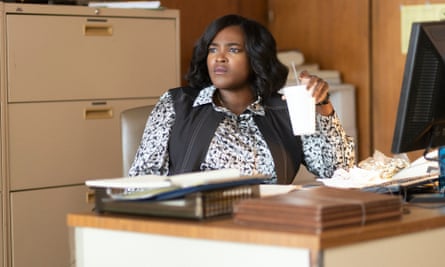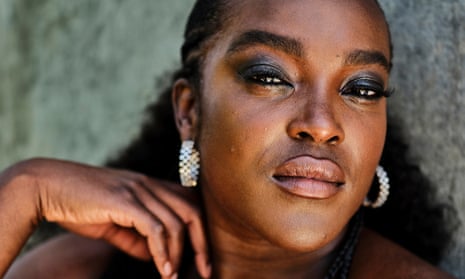For people who know TV, who appreciate its potential and its reach, a new Baltimore-set cop show from the creators of The Wire – AKA “the greatest TV show of all time” – is a big deal. A Very Big Deal. Wunmi Mosaku – one of the new show’s stars – has one of those very excited people as her husband. “The Wire is his favourite show,” Mosaku tells me from their home in Los Angeles. “He’s watched it all the way through five times.” Indeed, having missed The Wire when it first broadcast in 2002, Mosaku was midway through season one when she was called in to audition for the latest HBO miniseries by David Simon. She immediately pressed pause. “I didn’t want to internalise the pressure and go into the meeting with too much reverence,” she says. “Don’t get me wrong, I give people their props, and they’ve obviously created the greatest TV show of all time, but I don’t want to be a bumbling fool because of that!”
It was the right call, clearly. Mosaku was cast in the pivotal role of composed and tenacious civil rights attorney Nicole Steele in We Own This City, which starts on Sky Atlantic this week. The “city” in question is Baltimore, MD, and most of those involved in the production – from the head writers to the catering crew – are local either to that area, or to nearby Washington DC. Mosaku, meanwhile, was raised some 3,500 miles away, by Nigerian parents in the hippy-ish Manchester suburb of Chorlton-cum-Hardy, yet she never felt left out on set. “That whole crew from The Wire, they’re a family and they aren’t interested in cornering off. All they want is to expand the family, and expand the love of the city and its people.”
Simon and his frequent collaborator George Pelecanos have made shows about other cities since The Wire ended in 2008, including Treme, set in post-Katrina New Orleans, and The Deuce in 1970s NYC, but We Own This City is the first return to Simon’s home town. Based on a non-fiction book by Baltimore Sun reporter Justin Fenton, it details a jaw-dropping – but entirely true – case of police corruption, which unfolded even as the Black Lives Matter movement and the 2015 killing of Freddie Grey placed increased scrutiny on the city’s law enforcement.

Like a sequel-of-sorts to The Wire, We Own This City shows what 14 more years of the failed “war on drugs”, plus a Trump presidency and an economic downturn, will do to policing culture, and – spoiler alert – it’s nothing good. Many of the characters portrayed in the show are real people, including swaggering corrupt cop Sgt Wayne Jenkins (played by The Punisher’s Jon Bernthal) and his fellow bully-with-a-badge Daniel Hersl (Josh Charles from The Good Wife). Mosaku’s character isn’t based on any one individual, but she does represent many in the Department of Justice’s Civil Rights Division, who set out to uncover the extent of wrongdoing at Baltimore PD. “Nicole, to me, is more like the audience,” says Mosaku. “She’s everyone sat watching this at home, hearing these extraordinary facts – I mean some of the show is verbatim – and wondering what is wrong with our society? And where is the accountability? I felt like Nicole while I was reading the scripts. I was like: ‘How did this happen?!’”
Mosaku may not have a Baltimorean’s bone-deep understanding of how it all went wrong, but her impressive body of work has prepared her in other respects. After graduating from Rada in 2007 (her future Loki co-star Tom Hiddleston was a couple of years ahead), she had a string of roles in hard-hitting British TV dramas, culminating in her first Bafta win in 2017 for playing the courageous mother of the murdered London schoolboy Damilola Taylor in BBC One’s Damilola, Our Loved Boy. That led to bigger roles at home and in the US, including working with former stars of The Wire, Idris Elba (on Guerrilla, about the Black Power movement in 1970s Britain, and the hit detective series Luther) and the late Michael K Williams (on HBO’s civil rights-era fantasy-horror Lovecraft Country). In 2020, there was further awards recognition for her phenomenal performance as traumatised but proud refugee, Rial, in Remi Weekes’s widely acclaimed social horror, His House.
All these projects are connected by a strong thread of purpose, as Mosaku acknowledges: “I love a good drama, but I don’t want the truth of our stories to be missed from them. And I feel like they have been missed in a lot of TV I’ve watched and grown up on.” In the past, it seemed to Mosaku that real conversations about racial injustice were happening only on American TV. That’s changed now. “I was just watching the documentary Uprising [on the aftermath of the 1981 New Cross fire] by Steve McQueen and then I look at Small Axe and Michaela Coel’s I May Destroy You. I’m like, OK, the truth of being young, Black, British is being told! Where there’s truth, where there’s that momentum, that’s what I’m interested in.”

So We Own This City feels like exactly the sort of work she’s supposed to be doing. “This show is urgent. Not just for American policing, but in the UK; I mean everything that’s happened in the last year with Child Q. And I also think of End Sars in Nigeria’s protest against police abuse. It’s this question of who is policing us? Who gets to feel safe? And who doesn’t feel safe?”
Amid all the urgency, Mosaku has also made room to have some fun with her role choices. She had a booty-popping cameo in Robin Thede’s Emmy award-winning A Black Lady Sketch Show, and Marvel fans will know her as the no-nonsense, timeline-hopping Hunter B-15 in the Disney+ series Loki. This raised profile also means her public appearances are now full-on fashion “moments”. She was a vision in canary yellow on the Baftas red carpet and has stared out seductively from various magazine covers, images of which are widely shared and coo-ed over on social media. This amuses Mosaku, who has been sewing her own clothes since she was a teenage frequenter of Chorlton’s charity shops. “Y’know, I’m really not fashionable!” she says. “I love colour. I love African fabric, but my clothes are so comfortable. My stylist Shameelah Hicks, she’s the visionary. Every time I see her I’m like: ‘Thank youuu!’”
Nicole’s Clair Huxtable-esque look on We Own This City is also a world away from Mosaku’s own style: “Like, a weave? It’s just so not me, and sooo her!” But Nicole, in her earth-toned skirt suits and low-key jewellery, embodies the decorous patience of the incrementalist social reformer. Her daily work of teasing answers out of recalcitrant cops and sitting in on interminable City Hall meetings involves lots of listening. “It was an exercise in remembering that listening is action,” says Mosaku of her performance. “You just have to be present with the person.”
It’s a listening exercise for the audience, too, and what we hear is a story of city-wide institutional rot that is extreme, but not exactly surprising. “Y’know, I’m Black in America. I’m married to an African American, and so, my feeling towards policing has been … I’m scared,” says Mosaku. “I am scared, because you just don’t know how quickly things can escalate. Like you can do everything right, but it could still end up very wrong. My husband and I have a little system for when we’re pulled over by the police. I make sure I say something in my most British accent [adopts voice]: ‘I’m sorry officer, what’s the problem?’” This allows some of the tension to dissipate. “Because, even with an aggressive cop, the next question is generally: ‘Oh, where are you from?’ All of a sudden our humanity is in the picture. But I’m also aware that you don’t always have an opportunity to speak. And also I’m not always with my husband, y’know?”
When change is so necessary but is so slow coming, what do you do with your entirely justified anger in the meantime? It’s a question that bubbles beneath Nicole’s ever-professional demeanour throughout We Own This City, and Mosaku has developed her own response: “I channel my anger into my auditions and the work I’m lucky enough to get, but I don’t know … ” she trails off thoughtfully. “I don’t know if it gets exorcised completely.”
What’s left over, she must take to her next project or to her downtime. After our conversation, for instance, she plans to attend a Zoom yoga class, make chicken soup and perhaps return, pressure-free, to season one, episode five of The Wire. And yet, even if it were possible to leave Baltimore behind entirely, the waste-conscious Chorlton hippy within wouldn’t hear of it. “Don’t get me wrong, I’ll always take my costume home with me,” says Mosaku firmly. “Because, first of all: it fits and generally looks good. Second of all: now I have a costume for when I next audition to play a lawyer. And it’s environmentally friendly as well!” Now what would her Hollywood stylist have to say about that?
We Own This City starts at 9pm on Sky Atlantic on 7 June

Comments (…)
Sign in or create your Guardian account to join the discussion